“I would like to see even more visible, effective local politics”
“I would like to see even more visible, effective local politics”
CISPA: How did the collaboration with CISPA come about? What was the trigger and what convinced you?
Bernd Pohl: I've actually known CISPA since its early days. Together with faculty member Dr. Andreas Zeller I also founded the software company Testfabrik AG. I therefore had early professional contacts with Dr. Kevin Streit, CISPA’s administrative managing director, who was previously a student employee with us. We have crossed paths professionally many times. In parallel we further developed Testfabrik and I also built the coworking space. At the same time, CISPA was slowly establishing its technology transfer structures. It all happened roughly at the same time. It became clear to me very quickly: startups arise, among other things, from technology transfer—that's one of the important aspects. I'm also a spokesperson for the startup association. I wanted to build a coworking space for startups, community, and technology here in Saarland. That was an obvious match in terms of content. It was really exciting to work on.
How many startups are permanently based in Halle4? How many of them come from the CISPA incubator?
On site we have just under ten startups with a permanent base, plus several others that regularly come by to hold their team meetings here. Other startups tend to fluctuate. They aren't all from CISPA; some come from the university, from the htw saar, or are simply startups that don't come directly from the academic environment. That's a good mix. But of course, we have a high share of digital businesses and, in any case, a strong concentration of AI-focused companies here in the hall.
What advantages do you see for the startups in Halle4 from collaborating with CISPA?
There are several aspects that have proven themselves both in theory and in practice.
The first is the community aspect—the exchange. We have startups here at different stages and with different focuses. The exchange among them brings enormous value—and it doesn't have to be coordinated or scheduled; it happens naturally, for example at the bar. Philipp from QuantPi comes to the bar, then Dennis from XpectAI—people drink coffee together and talk about current challenges.
The second important aspect is very practical: we are probably the most flexible place in Saarland to build a business, to grow, or to downsize. You don't sign a lease here; you sign membership agreements that run month to month. You can add offices as you grow and give them up when you shrink. As a startup you don't know whether you'll have three or 30 people in three years. Signing a five-year lease in the city is a completely different story. Here you don't have to worry about anything except your business. We provide coffee, toilet paper, good spaces, shared resources, and everything that goes with it—and all of that within a strong community and a great environment.
The third aspect follows from that: startups have actually been born here, or people have moved from one startup to another company without ever having to leave the space. If a startup fails—which does happen—a few doors down sits StackIT, the cloud subsidiary of SchwarzIT, with its Saarland branch. They always need capable people. So, talent simply moves down the hall. Conversely, there are freelancers or people from larger companies who build up contacts here and then say: "Maybe I’ll join a startup—that sounds really exciting." That's how, for example, Max Losch from QuantPi ended up here.
I believe this is currently the only place in Saarland where that happens.
What sets Halle4 apart from other startup centers or coworking spaces?
For one, the size. If you have 200 square meters with ten people who meet occasionally, you’ll never get the same kind of dynamic as you do with 2,000 square meters and 150 workstations that are constantly changing and rotating. You need a critical mass—and we have that here.
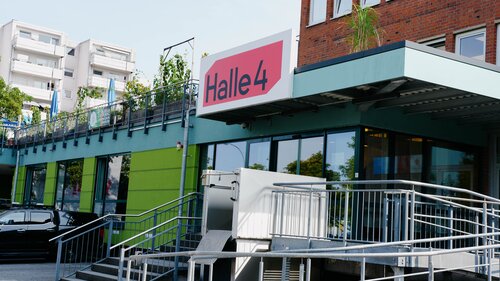
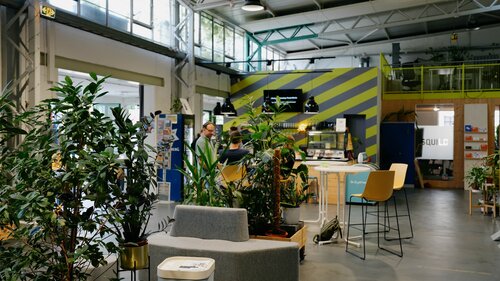
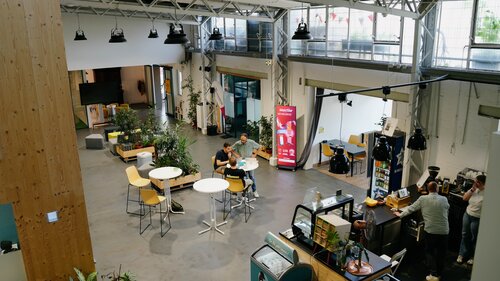
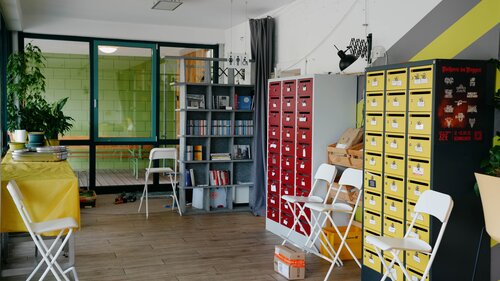
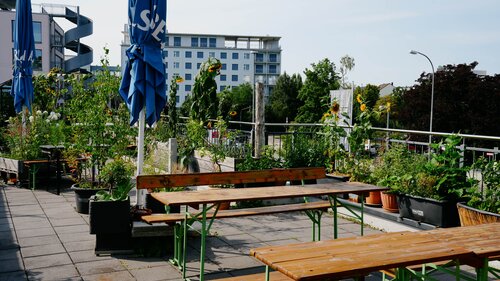
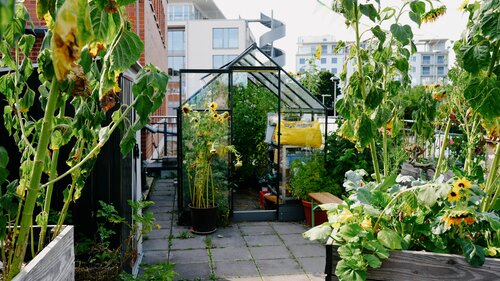
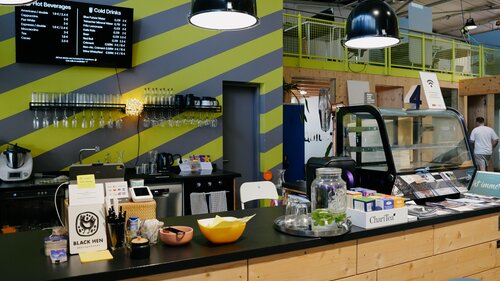
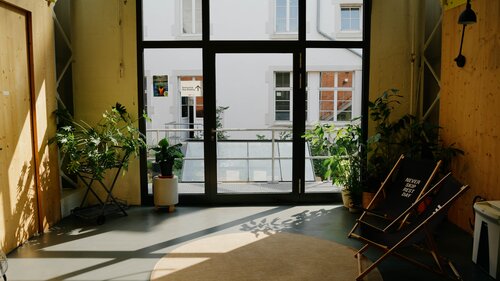
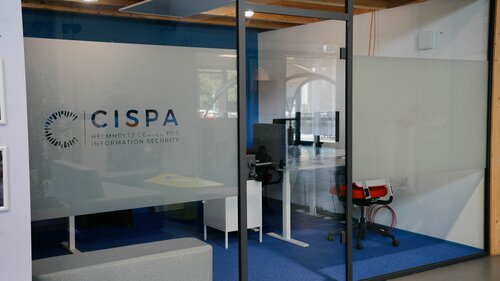
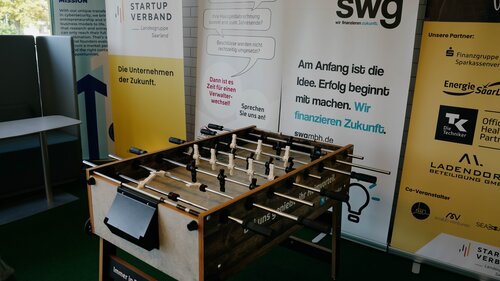
As already mentioned, you are one of the regional spokespersons of the Saarland chapter of the Startup Association, which CISPA has also been a member of since 2025. To what extent are you involved with Halle4 there?
That’s a strong core for me. An association is initially just a shell. The association handles a lot of political matters, and that happens in Berlin. The entire executive team is based there, right across the German Federal Parliament (Bundestag). That makes sense, because that’s where politics happen. But at the regional level you need points of contact with the local scene—and that’s harder. An informal meet-up every few weeks isn’t enough. The hall is the perfect nucleus for that: different players are always coming together here, and you can drop in anytime if you want to learn about startups or exchange ideas. That’s what brings things to life. We combine that with our #Saarfari activities, where we specifically create events and initiatives for startups in Saarland.
What exactly is Saarfari and what does it bring to the Saarland ecosystem?
The basic idea is the same: it’s about bringing the scene and the community together. The concept: we put 20 people on a bus and spend three days outside of Saarland. They have to engage with each other, get to know one another, and build contacts. At the same time, we enrich the group with people from CISPA, Triathlon, FITT, SIKB, SWG, and EastSideFab. That creates closer ties to institutions that can offer support.
We also expose people to other ecosystems. In Hamburg, Berlin, or Munich they meet successful founders who give them new perspectives, show them how to think bigger, what mistakes to avoid, and much more. In Saarland there’s a tendency to think small. Then you meet someone who made an exit of €300 million six months earlier, and suddenly you think: “Okay, that’s achievable.”
Of course there’s also plenty of fun. We put together a solid program. The feedback has been huge—some people have been on every Saarfari, new people keep joining, and the responses are consistently positive. That’s why we keep it going and try to offer it at very fair prices with the help of sponsors.
What kinds of collaborations would you like to see within the Saarland startup ecosystem?
It still happens that similar things take place in different places at the same time. That’s understandable, because every institution has its own agenda—but it’s not helpful. Small structures get fragmented that way. It has improved over the past few years, but I would like to see more visible, effective politics. In principle everyone is well-disposed towards us, but they’re often too distant or don’t dare to take the next step.
One example: in Munich, economic development institutions (Wirtschaftsförderung) and other institutions are located directly inside coworking spaces like the Co-Lab. They have offices there, are present, and are direct points of contact for startups. That would make sense here, too. I’d much prefer it if institutions like the Ministry of Economic Affairs, the city, or the economic development agency would simply book a table here sometimes—it’s not expensive. Then startups wouldn’t have to run to 17 different institutions; they would have everything in one place. Things would just happen, without having to schedule 24 separate meetings. We need much more of that going forward.
Thank you for the interview, Bernd!
More information about Halle4: https://www.halle4.net